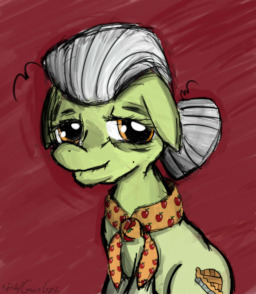
Chapter I
Tears streaming down her cheeks, Applejack shifted her bewildered gaze from her mother to her grandmother. Both wore the same serene expression, but one's eyes blazed like the candles scattered around the room while the other's were closed in a slumber as eternal as the stars beyond the frosted window. Applejack gritted her teeth, biting back a fit of sobs, a bitter rebuke, or both.
Granny Smith broke the deathly silence, her voice like an iron dropped on a pane of glass, "You want to know why I'm alive and she's dead."
Her eyes widening, Applejack opened and closed her little mouth a few times before she found her quavering, high-pitched voice, "How did you know?"
Granny Smith sighed like only a wizened old mare could and handed the rose-maned foal over to her father, "Believe me, child, you're not the first to have wondered about that, and you certainly won't be the last."
Applejack's father, who stood beside Big McIntosh and barely a head taller, cradled the foal who had cost him his wife in his faded hooves and lowered his head so his tan cowpony hat, which he wouldn't be wearing at her wake were it not the one she'd given him for their tenth anniversary, veiled his eyes in shadows. His tears gleamed in the candlelight.
Ignoring his faint sobbing, Granny Smith continued, "You probably also want to know why I haven't aged a day in the decade or so we've known each other."
Applejack, who was still curled up by her mother's side, nodded and wiped the tears from her eyes, matting the fur on her cheeks.
Granny Smith allowed the ghost of a smile to haunt her features. She preferred to tell her story under lighter circumstances, such as when looking over old photo albums in which she stood as the sole constant among generations of Apple Family members, but if it kept her grandchildrens' minds off their grief, she was happy to make an exception, though she knew it would only raise more questions.
"Well," she began, "it all started about two centuries ago when Ponyville was a frontier town like Appleloosa. Cider wasn't such a big seller back then, so at the end of the day, we still had half a dozen barrels leftover. I was rolling the last one into the cellar to ferment and be sold the year after when..."
***
"Who's down here?" I asked with all the courage I could muster, having heard leathery wings flapping through the shadows the lanterns cast from the wooden support beams. The long day of inspecting apples and hocking cider in the sweltering sun had left me exhausted, and the very-real possibility that I was dealing with a pygmy manticore, a bat pony, or some other mythical meat eater made my knees creak—though that could have been my arthritis, for I was in my late twenties at the time. Anyway, I'd tangoed with timber wolves before, so I knew most beasts were as scared of me as I was of them unless they were hunting or protecting their kin, but this was the first time I'd seen one drunk.
Of course, I didn't notice the incriminating evidence until I'd taken a bold step from the entryway onto the dirt floor only to slip and fall face first in the mud, at which point the fumes of fermenting apples wafting up from the floor were impossible not to notice. I looked down, saw a puddle of cold, sticky cider spilled across the floor, and traced it to a gnawed-open barrel in the far corner, where a burgundy-furred rodent-like thing with big bald ears and menacing leathery wings like dry leaves clung to the upper rim of the hole, facing away from me. Its head dipped into the flow of cider, and its tongue tried in vain to lap up every drop.
I'd seen fruit bats before, but aside from claiming one of the western orchards for roosting, they'd never given us any trouble. This one didn't look like any fruit bat I'd ever seen, though. It had thicker muscles, sharper claws, and when it twisted its head around, I saw that its eyes were solid red beads, but they weren't looking at me; they were looking at the baked apple pie emblazoned in the fur on my flank.
The bat licked its long, pearly fangs.
I screamed.
The bat screeched like a banshee. The furious flapping of its wrinkled wings made the lantern flicker, and the searing pain when its fangs sunk into my skin and drained my blood as I lay paralyzed on the cellar floor snuffed it out completely.
I didn't die that night. The next few days saw me drifting blearily in and out of consciousness just long enough to catch glimpses of my worried relatives and snippets of their conversations with the countless doctors, witch doctors, priests, and apothecaries they'd brought in, none of whom could figure out what was wrong with me. My condition continued to worsen, and on the third day, my heart stopped.
"She was too young to die," one of my relatives who was about my age sobbed, breaking the silence at my wake and making me aware that I wasn't quite dead.
I wanted to laugh and crack a joke about her time in Canterlot filling her head with unrealistic ideas and how I'd have died of old ages in a few years anyway, and I would have, but shortly after I regained consciousness, I was overcome with the primal, single-minded hunger of a predator. I wasn't hungry for meat, though; I was hungry for apples. The mental image of a big, shiny, juicy, bright-red apple clouded my thoughts and made my mouth water. I sniffed the air, and the strangled gasps that followed told me my relatives had been paying attention, but their shock was the last thing on my mind. When I caught the scent of fresh fruit, my eyes shot open and I sat bolt upright.
My relatives screamed.
I leaped out of bed with a youthful energy I didn't have and bounded off into the next room, which happened to be the kitchen. I blindly followed the scent, and it brought me to the table, where a steaming apple pie fresh from the oven greeted me. I planted my forelegs on the red-and-white-checkered tablecloth and buried my face in the pie. My snout crunched the flaky, buttery crust, and I swirled my tongue around to lap up the crisp apple slices and gooey filling as it matted my lime-colored fur. I noticed it could use more cinnamon, but instead of mentioning it, I kept eating until I couldn't anymore and fell back against the floor, my legs sprawled lazily by my sides as my bloated body shivered in euphoria.
My terrified relatives peered in at me from the doorway. They flinched when we made eye contact, but to their credit, they held their ground. One of them was hiding something behind his back.
I craned my neck to see what it was, but he shifted uncomfortably to block my view. I crossed my forelegs in a pout and considered getting up and scolding him—I was at least a generation his senior and in no mood for hide and seek—but the floor was so comfortable I couldn't bring myself to budge.
My inaction seemed to set them at ease. The mare who stood next to the stallion with her foreleg around his withers—to restrain him, support herself, or both, I couldn't tell—worked up the courage to ask, "Granny, is that you?"
"Who the hay else would I be?" I asked reasonably, but she bristled.
"You're not a vampire, are you?" the mare pressed.
Then I realized what the stallion was hiding—a stake. My eyes narrowed dangerously. I tried to flip onto my hooves like a skilled acrobat, but my energy had left me, and the movement was neither impressive nor threatening. Nevertheless, my relatives froze and held their breath as I stomped over and glared at him.
The stallion craned his neck back involuntarily, dropped the stake with a clatter, and gulped.
I smacked him across his face with the flat of my hoof and more force than intended—but not by much.
The stallion howled and crumpled to the floor, cradling the rapidly growing welt on his cheek with one hoof and backing away from me with the other three.
"Granny!" the mare cried, standing between us to block my advance. "What'd you do that for?"
I pointed an accusatory hoof at him and cried back, "He was gonna stake me!"
"He was just trying to protect us!"
I fell silent, her question about me being a vampire only just beginning to register. I sagged to the floor, shook my head, and said, "I'm not a vampire... I guess I'm not much of a pony anymore, but I'm not a vampire."
"What are you, then?" the stallion asked.
"A fruit vampire," I answered vaguely and without thinking.
"A what?" the mare asked, stifling a laugh.
"I'm a fruit vampire," I said with conviction. The realization had come first, the reasoning trickling in after. I thought aloud, working through it as it came to me, "The last thing I remember before falling ill is being bitten by a strange bat that found its way into the cider cellar and gnawed open a cask. It had big fangs, beady red eyes, and so much muscle I can hardly believe it could fly."
"A vampire bat," the stallion muttered.
"It wasn't, though," I continued, absently snatching an apple from the fruit bowl on the counter as I walked by. "Vampire bats are supposed to have sleek wings and pitch-black fur. This one was the color of spilled wine, and its wings were brown and crinkly like dried leaves. One of our fruit bats must have strayed too close to the Everfree Forest, gotten knocked up by a proper vampire bat, and birthed some sort of weird, probably infertile hybrid with the same means of extending its life but a taste for fruit instead of blood."
"That's absurd," the mare scoffed.
"How else can you explain the fang marks beneath the fur of my cutie mark, the mysterious illness that stopped my heart, and the hunger so strong it brought me back from the dead?" I asked, taking another bite of my apple for emphasis and moaning involuntarily as its juices danced across my taste buds.
The mare was silent for what would have been an uncomfortably long time were I waiting for a response or even paying attention, during which my munching was the only sound. At last, she walked over to me, hung her forelegs around my neck, cried into my white mane, and said, "I'm so sorry, Granny."
I shifted uncomfortably, my frail old bones barely supporting her modest weight, and said, "Aw, I can't hold it against you. It is pretty ridiculous when you think about it." I glanced appraisingly at the stallion, who had since picked himself up from the floor, kicked the stake away, and taken to staring warily at me from the doorway, and said, "I suppose I can't hold it against you, either. Somepony must have discovered the bite mark while preparing my body; you were just trying to protect your kin on the off chance that something like this happened."
The mare, whose name still hadn't returned to me, hugged me tighter but mercifully lowered us both to the floor so I didn't have to support both our weight. Trying in vain to stifle her sobs, she mumbled, "It's not that."
"What is it, then?" I asked.
She didn't answer.
***
"...Only much later, when I'd learned to live with gorging myself on fruit everyday, serving as a midwife for generations of Apple Family members, watching them live out their lives, burying them with my own hooves, and experiencing the same old aches and pains year after year, did I realize what she meant. On the bright side, you won't find a manager with more years of experience this side of Canterlot Castle," Granny Smith finishes. Satisfied that her target audience has been sufficiently distracted, she smiles genially at Big McIntosh, who's heard her story before and continues to cradle Applejack's lifeless hoof and wail loudly and without a thought for dignity.
Big McIntosh never cried—not at his mother's funeral, and not at his father's—but upon discovering Applejack sleeping in, failing to rouse her, and realizing the rhythmic rise and fall of her chest had ceased, his stoic facade shattered. Nopony thought less of him for it.
Knowing his time is nearing its end as well and the emotional release will do him good, Granny Smith turns to the two young faces in the room—Apple Bloom, who discovered her talent for architecture several years ago recently finished rebuilding the farmhouse from the ground up, and Sweetie Belle, who canceled an apprenticeship with Sapphire Shores made possible by her talent for singing as much as her sister's wide-reaching network of connections, to comfort her friend.
Apple Bloom and Sweetie Belle insist they aren't together, but while her eyesight has gone the way of the aristocracy, their charade is as transparent to her as the corrective lenses she never wears.
Out of the blue, she says to Sweetie Belle, "I have no problem with you courting my granddaughter, you know."
The blunt force of the proclamation knocks Apple Bloom, who was hunched over in deep thought, out of her seat. She flails her forelegs like a hummingbird in a vain attempt to recenter her balance.
Sweetie Belle catches her with her forelegs, inadvertently pulling her against her chest like two dancers entwined in the interesting part of a waltz. They blush profusely, pull apart, scoot to opposite ends of the love seat, and avoid eye contact with each other—all in the space of a few seconds.
After a moment of watching through amusement-wrinkled eyes as they interrupt each other trying and failing to form responses, Granny Smith continues, "I can't say I see the appeal, but 'you love whom you love,' as Smart Cookie, who was really a stallion if Princess Celestia is to be believed, once proclaimed to Chancellor Puddinghead when she exposed his affair with Clover the Clever. In Equestria's early days, the law prohibiting interracial relationships was still in effect, but the gesture was so romantic Princess Platinum granted them both asylum. Some scholars consider that the true beginning of the unification."
Her demeanor darkening and her voice growing distant, she concludes, "If I had to make an argument against it, though, it'd be that unicorns live up to three times longer than earth and pegasus ponies. To live with the death of your beloved for two whole lifetimes isn't a fate I'd wish on anypony, which is why I haven't shared my affliction despite requests from a few members of Filthy Rich's family who know about it. If they want to outlive their kin so bad, they can suck blood. In fact, I wouldn't be surprised if some of them do."
The faint blush still dusting the light-gray fur beneath her curly lavender locks growing deeper as she scoots back across the love seat to drape her foreleg around Apple Bloom's yellow withers, Sweetie Belle manages to make eye contact with her and says in her refined, melodious voice, "Youthful idealism may tint my thoughts, but the way I see it, the finiteness of our time together makes it that much more meaningful."
"Besides," she continues, raising Apple Bloom's head with her hoof to meet her eyes and offering a heart-melting smile and tentative nuzzle, "fifty years apart is nothing compared to the eternity we'll spend reunited with each other and all our friends and family in Hades." Sweetie Belle glances to the bed where Applejack rests peacefully before turning to Granny Smith with pure sympathy in her eyes and concluding, "Life unending, the way I see it, is a fate worse than death."
Granny Smith could never tell them the truth, that while absence makes the heart grow fonder, too many lifetimes apart makes it forgetful. She can only hope her experience stems from having a heart that hasn't beat in two centuries, but she can't shake the chill that runs up her spine at the thought that her deceased relatives might not know her when finally gets to see them. Realizing she's lapsed into prolonged silence and looking up to see Apple Bloom and Sweetie Belle's faces wilted with concern, she eases their worries the best way she knows—with a story.
"No life is truly unending, and mine is no exception," she begins. "This farm has been my life since I was a little filly; our fates are linked. Billions of years from now, when the sun dies, so too will Princess Celestia join her little ponies in Hades. A few short centuries from now, when the trees no longer bear fruit and Sweet Apple Acres is a distant memory..."
***
I'll walk among the groves of apple trees, their barren branches casting shadowy webs across my path, and fondly remember the years gone by. The powdery snow will pack under my hooves and freeze my legs, and the insatiable hunger will gnaw at my stomach and cloud my mind. I'll look to a skeleton of a tree in search of something, anything to dull the ache, and while I'll find nothing, a memory of watching my grandchildren play in its shade will remind me where I'm going and distract me long enough to get there.
Though my legs will have grown numb, I'll keep walking until I reach the first tree I planted without my father there to help, the one I used to mark the grave where I buried him. When I crest the hill, I'll find that the tree, like me, will still be standing after all these centuries. No others will grow around it, for its deeply entrenched roots will leave no room.
I'll smile up at the tree's thick, towering trunk and sprawling, leafless branches, and with the last of my strength, I'll paw at the frozen earth until my hooves touch the tree's roots, curl up against them, and drift off to sleep. The snow will bury me, and the cold will preserve me long enough for the carrion eaters to find me and feed their young, but not before the wind pulls one last crinkled leaf loose from the branches and carries it down to alight on my exposed ribs.
Though my body will soon shut down for lack of the fruit that's kept it alive, my spirit will be free to embark on its long-overdue journey to Hades and reunite with the spirits of all the relatives I've buried over the centuries.
My father will be the first to greet me and welcome me home. "How I've missed you, Granny," he'll say, embracing me warmly as my mother joins us. "We thought we'd never see you again."
I'll hug them with an immaterial body free of my earthly aches and pains, look to them through eyes clear of the cataracts that have obscured my vision for longer than I can remember, and tell them what my brief foray with immortality has taught me, "Death can't be stopped; it can only be delayed."






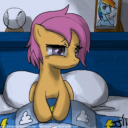
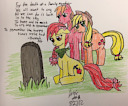
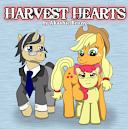
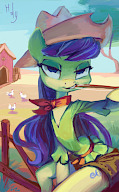
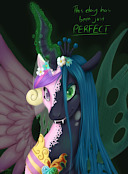
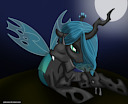

The description really, really confused me until I decided to just read the fic.
This was...interesting, and the tags certainly fit. It's like some sort of cruel joke; a fruit vampire, hilarious in concept yet tragic in execution.
I think the reason I don't like it is because I'm just so...confused. I don't think it's bad, neither is the idea. It's just so weird, the tragic nature and poetic ending of this fic make me want to take it a bit more seriously, invest a bit more emotional weight into it. But the whole thing just seems too silly for that. I honestly just can't find the feelings to place into this story and just default to shrugging.
Finally a good vampire story. Its been almost a decade since I last read decent one.
2378161
Haha! That, my friend, is exactly the reaction you should have.
2378484
In that case, keep an eye out for Fluttershy, Vampire Hunter, in which I'll deal with classical vampirism.
2378161
Yeah... I only read it because it was added to Equestrian Vampirism
I wouldn't call it comedy, really. Tragedy is a good fit though.
Overall, it's pretty well paced. The transition between past, present and future linked by Granny's words works well.
But for a fiction that starts its description with the concept of Applejack's funeral, you really glossed over it in favor of the Apple Bloom/Sweetie Belle thing - which really came out of left field for me.
All things considered, you made this odd premise work rather well. Good work!
2381488
I'm bad at being intentionally humorous, but the tags make more sense when considered as a single unit: tragicomedy.
I worried the shifts in tense and point of view would throw readers off, so your comment gives me hope that I can apply it to future works.
Granny Smith's narrative focus reflects that she's seen so much death that it ceases to affect her anymore, while Apple Bloom and Sweetie Belle's interracial relationship is an allegory for her situation.
2381621 Tragedy, as pronounced by Fimfiction: " A Tragedy has a sad ending, but it doesn't mean the story is sad until that point. Unlike a Sad story, it always, always will have a sad or bittersweet ending." This means that the story will be comedic, until the end. Unless, you aren't planning on that, then I'll just leave now.
" A Tragedy has a sad ending, but it doesn't mean the story is sad until that point. Unlike a Sad story, it always, always will have a sad or bittersweet ending." This means that the story will be comedic, until the end. Unless, you aren't planning on that, then I'll just leave now. 
2382895
My logic was as follows: a drunken fruit-vampire bat biting Granny as an explanation for her unnatural longevity is funny, but the implications are unfortunate. The show's over, though, so feel free to leave whenever.
Truly another one that is completely and utterly you. Beautiful and touching and at the exact same time, totally bizarre.
2462855
Nonsense is a relatively new development in my writing and not an especially popular one. It doesn't seem intent on leaving anytime soon, though, so I'm glad I have an audience for it.
2463758 I freely admit I don't usually adore nonsense but your take on it has completely and utterly sucked me in. I hope it stays for a while.
Well done. Was a little confusing going from flashback to present and vies versa but otherwise very very good.
2469362
Considering how most stories are told in the past tense, that makes sense. Tense shifts are another growing trend in my writing. I'd like to use the future tense more often, but it's so rarely applicable.
Interesting concept... kind of similar to how Equestrian lycanthropes in some stories were bitten by timberwolves, and are more plant-like in nature.
2701195
I haven't read any like that, but I like the concept. Which would you recommend? In one story, the name of which I can't remember, particularly magical earth ponies can cause plants to sprout around them spontaneously.
Hey, because this was short and I could get through it before heading to bed (I'll be starting The Magician and the Fiddler after I get up, with any luck), I did just that, so you're getting some of my thoughts on it whether you care for them or not.
Though you say to take it as a surrealist piece and not treat it seriously, I find myself with a question: Why does Granny Smith say she was likely set to die of old age in her early thirties, when it's implied ("Applejack opened and closed her little mouth a few times […]", "[…] haven't aged a day in the decade or so we've known each other") that at or past the age of ten, Applejack is still a fairly little girl? I suppose that maybe differences in life expectancy could account for that, but it sort of sounded like life on the farm hadn't changed all that much in two hundred years.
Aside from the confusion that that caused me, I found a few minor errors that I didn't bother marking down, in part because of how tired I am and in part because they really were very minor.
All that I can really say about this story is that it was interesting. The path of the narrative was fun to follow, and the characterization was done well enough in almost every case—I found myself disliking how Sweetie Belle alone was handled, if only because I see her as a very sweet, open little girl in the show, and here she seemed a bit too distant in her interactions. The story's material flies in the face of canon now, though I imagine it was conceptualized before "Apple Family Reunion" aired. Still, it was enjoyable enough to get an upvote from me.
Good night, Fool. More from me later.
Oh, P.S. – It probably bears mentioning that I think the Comedy tag is misplaced. While Granny is essentially her usual sassy self once she wakes up at her wake, the story wasn't really funny beyond that—comedy that pretty much just stems from the characters being themselves isn't usually something I'd say is deserving of the Comedy tag, as it just isn't what the story is centered around in most cases (and, indeed, in this case). While the concept of a fruit vampire might seem silly, it's played entirely straight within the story itself, handled maturely enough that I'd say I didn't even chuckle at its use.
2711260
I appreciate your going the extra mile in reviewing this story as well. At the time of writing, though, I'm tired too, so forgive the lack of transitions between the following responses to your critique:
Now that I think about it, absurdism is probably the more relevant movement.
Applejack's portrayal is a discrepancy I failed to catch. In my stories' canon, earth ponies are adults at the age of six. At ten, Applejack ought to be the equivalent of a thirty-year-old human.
I could reasonably argue that Sweetie Belle has learned to be more reserved through her exposure to the wider world, but not only is that not the sort of thing I'd write intentionally, it'd be irrelevant anyway given that she's in the company of old and dear friends.
I'm vaguely aware of what was set out in Apple Family Reunion, and aside from Fiddlesticks's appearance, I couldn't care less about any canon it established.
The Comedy tag only makes sense in context with the Tragedy tag, for the intended genre is tragicomedy. That said, I've been told that deadpan is the comedic style to which I'm best suited, so I tried to capitalize on that.
I look forward to seeing what you had to say about The Magician and the Fiddler, but I feel as though I should wait until morning, when I can give your wise words the consideration they deserve.
Tragicomedy well done...
It's been a while, but take a thumbs up